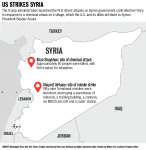Some UCLA students from Syria said they support the American government’s decision to order a missile strike on Syrian government forces.
The U.S. launched a missile strike on a Syrian air base April 6. U.S. officials claimed Syrian President Bashar Assad’s regime launched a chemical weapons attack from the base on the town of Khan Shaykhun on April 4.
According to Syrian state media, 16 people were killed in the strike, including seven military personnel and nine civilians, four of whom were children. U.S. media outlets could not independently verify the death toll.
Some students said they recognize President Donald Trump may have ulterior motives in pursuing such an intrusive strategy in Syria, but they see its outcome as a potential advancement in the fight against Assad’s regime.
“Bashar al-Assad has been slaughtering his own people with little to no accountability,” said Reem Karmouta, a second-year human biology and society student from Syria. “This is the first sign of hope for the downfall of Assad for the Syrians who have been protesting his ruthless regime for years.”
Karmouta added she is relieved to see Assad has been opposed in some way.
“We are well aware that this is a calculated move on the part of the administration,” she said. “However, for once, Assad has been halted in some capacity.”
Ahmad Baddour, a third-year microbiology, immunology and molecular genetics student from Syria, said he thinks the missile strike was a necessary response to the Syrian government’s use of chemical weapons.
“The U.S. is considered to be the strongest country, and therefore, the only one capable of protecting unarmed Syrians,” Baddour said.
The missile strike marks the first instance in which the United States used direct military intervention against Assad’s forces since the start of the Syrian civil war. Trump said in a statement after the strike that he was motivated to retaliate against the chemical weapons attack on innocent civilians and helpless men, women and children.
Experts critiqued Trump for not having a long-term strategy pertaining to the Syrian civil war.
Eric Bordenkircher, a researcher at the UCLA Center for Middle East Development, said he thinks the Trump administration ordered the missile strikes to give the appearance of a coordinated response to the committed atrocity, but its long-term strategy remains unclear.
“President Trump wants to appear as the antithesis of Obama,” Bordenkircher said. “The missile launch is (an) attempt to demonstrate this image.”
The missile strike has also caused tension between the U.S. and Russia. Russian President Vladimir Putin was quick to condemn the missile strike as illegal under international law and warned it would substantially strain Russia-United States relations.
Putin suspended military information sharing between Russia and the U.S. shortly after the strike.
Daniel Treisman, an expert of Russo-American relations and political science professor at UCLA, said in an email he agrees with Putin on the criminal nature of the missile strike.
“(The missile strike) makes cooperating on a negotiated end to the Syrian war considerably harder and makes it even less likely there will be some sort of major deal to improve relations,” Treisman said.
He also said he thinks the Russian government aims to assert its dominance over Syria, as the country tried to do throughout the duration of the civil war.
Though escalation of Russian aggression and the use of an interventionist policy has sparked both criticism and support from all parts of the political spectrum, Karmouta said she thinks people should consider the perspective of the Syrian civilians.
“The chemical attacks left individuals with zero family members, some losing up to 25 relatives,” Karmouta said. “Here, safe in the United States, it’s difficult to even imagine what that feels like.”
